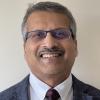Professor Ravindran Kuzhupilly Ranjith MBBS, FRCS, MSc Orth Engg, Dip SICOT, MSc Orth, MCh Orth, FEBOT, FRCS Trauma & Orthopaedics
"Prof Ranjith"
Consultant Orthopaedic Surgeon
An internationally acknowledged Consultant Orthopaedic Surgeon, known to his colleagues and patients alike as "Prof Ranjith". He has super-specialist interests in sports injuries and knee surgery.
He has over twenty years of experience adapting and perfecting the most advanced surgical procedures including robotic and arthroscopic surgery. He has performed over 1,000 total hip replacements and over 1,000 total knee replacements.
His training has also included further education within the USA, UK and Ireland before being appointed as Consultant in 2010. Prof Ranjith has one of the highest levels of success for joint replacement and partial replacement surgery. He also has an interest in soft tissue knee surgery including arthroscopy of the knee, ACL reconstructions, sports injuries and cartilage regeneration techniques.
Qualifications including place of study:
- MBBS
- FRCS (Royal College of Surgeons of England)
- MSc in Orthopaedic Engineering, Cardiff University
- FRCS Trauma & Orthopaedics, Royal Colleges of Surgeons of UK and Ireland
- Dip. SICOT, Societe Internationale de Chirurgie Orthopedique et de Traumatologie
- MSc Health Science & Clinical Practice (Orthopaedics), University of Central Lancashire & Wrightington Hospital
- Fellow EBOT, European Board of Orthopaedics and Trauma
- MCh Orthopaedics, Wrightington Hospital and Edge Hill University
Other professional positions:
- Associate Clinical Advisor to the Parliamentary Health Service Ombudsman – with effect from 19 October 2012
- Professor for Orthopaedic Surgery – New Vision University, Tbilisi, Georgia – 17 January 2020
- Previously Clinical Director Trauma and Orthopaedics- Basildon and Thurrock University Hospitals, 1 August 2019 to 31 March 2021.
Personal treatment philosophy
It is important to me that treatment is always tailored to the needs of each and every one of my patients, rather than taking a formulaic, 'one size fits all' approach. There is often more than one treatment option and the best approach, I feel, is to involve the patient as much as possible in the decision-making process. I try to give as much information as possible to each patient. I find out their individual needs and priorities and we then arrive at a joint, properly informed decision.
Why did you choose this specialism?
I find this is a very logical and precise specialty underpinned by physics and engineering, where what we achieve in terms of surgical plan, is evident to all once we put up the imaging. The logic and precision of this field of surgery appeals to me.
What makes a “good day at the office” for you?
A pleased patient with a good outcome makes a good day at the office for me.
What piece of advice do you most often give your patients?
I advise my patients to do low impact exercises, to strengthen their muscles with targeted exercise and to listen to their bodies.

